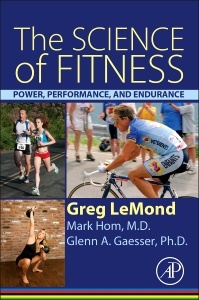Description
The Science of Fitness
Power, Performance, and Endurance
Authors: LeMond Greg, Hom Mark
Language: English
Subjects for The Science of Fitness:
Keywords
adenosine triphosphate; aerobic exercise; aerobic versus anaerobic exercise; age-related brain atrophy; antibiotics; antioxidant; athlete; athletic gift; ATP synthase; bicycle computer; blood glucose; body fat; brain; calcium; cancer metabolism; carbohydrate; cardiac output; cell energy; cell membrane; cerebellum; cerebrum; cigarette smoke; Coenzyme Q10; cognitive function; degenerative disease; detraining; dietary fat; dietary fiber; disease prevention; education; electron transport chain; empty calories; endosymbiosis; endurance; enzyme complex; epidemic; essential amino acids; evolution; exercise addiction; failure to thrive; fat burning; fat metabolism; fish oil; fitness; food supply; free radical; genome; glutathione; glycemic index; glycogen; grieving; health; heart; heart rate monitor; heavy metals; high-intensity interval training; hippocampus; horsepower; inactivity; insulin; iron; Krebs cycle; lactic acid; lead poisoning; lifestyle; liver; long steady distance; longevity; lungs; magnesium; metabolic syndrome; metabolism; mitochondria; mitochondrial myopathy; mitochondrial research; mitochondrial theory of aging; mortality; motivation; muscle atrophy; muscle fatigue; muscle mass; mutation; nanomotor; neuron; neuroplasticity; neurotransmitter; Nobel Prize; nutrition facts label; nutritional supplement; obesity; olive oil; overuse injury; oxygen consumption; ozone; physical fitness; power metering; protein; protein synthesis; proton gradient; public awareness
208 p. · 15x22.8 cm · Paperback
Description
/li>Contents
/li>Readership
/li>Biography
/li>Comment
/li>
The Science of Fitness: Power, Performance, and Endurance clearly explains the vital connection between diet and exercise in the human body. With this knowledge, you can use the right exercise and nutrition to obtain a higher quality life, prevent disease, and slow the aging process.
Authored in a straightforward style and with color images throughout, this book explores the cellular science behind fitness, protein synthesis, and healthy living. With it you will learn the most recent and important discoveries in the relationships between physical fitness, nutrition, weight loss, and weight management. It provides key information on the body?s mitochondrial processes and their role in aging, along with well-informed discussions on general nutrition, sports nutrition, exercise physiology, how to enhance athletic performance, and how exercise strengthens the mind.
Whether you are interested in how to eat healthy, train for your first (or next) marathon, take your fitness to the next level, find the best super foods, or simply want to improve your vitality through healthy, doable practices, this book will help you on your journey regardless of age or fitness level.
2. The Human Machine
3. Amazing Mitochondria
4. Feeding Your Cells
5. Mitochondrial Supplements
6. Your Body at Work, Play, and Rest
7. The Body–Brain Connection
8. When Things Go Wrong
9. Slowing the Aging Process
10. Gauging Fitness
11. BEAST Fitness Training
12. The Finish Line…and a Starting Line
Trainers, competitive and elite athletes, recreational athletes, students of nutrition, physiology, physical therapy, medicine, and biology as well as PCPs and endocrinologists dealing with diabetes and obesity patients.
Dr. Mark Hom, M.D. is a Johns Hopkins University trained biologist (B.A. in Biology with Honors), an award winning artist (Kenan Art Award, first place), an award winning medical illustrator while attending medical school at the University of North Carolina (a UNC Dean's grant recipient and also a UNC Holderness Fellowship recipient), a practicing interventional radiologist (one of the most in demand medical specialties), an educator of young doctors (an Assistant Professor of Radiology), and an avid fitness cyclist (riding 4,000 miles per year). Dr. Hom will explain how the human body, various organ systems, and individual cells function in the biologic process of exercise. Dr. Hom will show that mitochondria are at the center of cell energy production, metabolism, and athletic performance, as well as an underlying cause of degeneration, aging, and many diseases. He is currently a member of the Department of Radiology at Virginia Commonwealth University in Richmond, VA.
- Presents the connection between exercise, nutrition, and physiology in a way that is ideal for both experienced athletes and newcomers
- Provides the scientific basis for mitochondrial functions and their relationship to fitness, protein synthesis, quality of life, and the aging process
- Synthesizes the latest research on nutrition, sports nutrition, super foods, and the brain/body connection
- Co-Authored by legendary cyclist Greg LeMond, who illustrates key points using his own athletic journey
These books may interest you

Nutrition for Elite Athletes 56.31 €

Nutrition for Elite Athletes 208.65 €

Concepts in Fitness Programming 208.65 €

